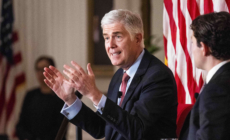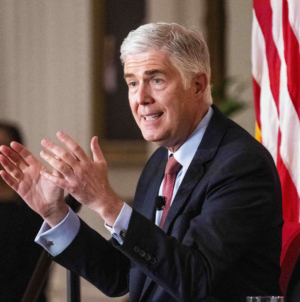-
Neil Gorsuch Helps Sway Supreme Court Ruling in Liberal Justices’ Favor - 14 mins ago
-
What’s next for LIV Golf? CEO Scott O’Neil says future ‘looks like Formula One of golf’ - 17 mins ago
-
For Chinese auto part suppliers, Americans are picking up the tab for Trump’s tariffs - 18 mins ago
-
Trump considering announcing “External Revenue Service,” sources say - 25 mins ago
-
Best Knicks vs. Cavaliers Prop Bets, ATS Picks: How to Bet NYK vs. CLE - 57 mins ago
-
Angels' Mike Trout smashes his first home run of the season, a solo shot vs. Cardinals - 60 mins ago
-
Secrets, espionage tools and a 110-year-old lemon on show in exhibition from Britain’s MI5 spy agency - about 1 hour ago
-
Donald Trump’s NOAA Cuts Criticized Amid Huge Sea Lion Deaths in California - 2 hours ago
-
Colorado Buffaloes vs. Villanova Wildcats the Crown highlights | CBB on FOX - 2 hours ago
-
COVID 5 Years Later: Impact on the Workplace - 2 hours ago
‘Buy Canadian’ Movement Is Costing US Companies
Canadian companies boycotting American goods in response to Donald Trump’s tariffs is impacting some American businesses.
Newsweek contacted the Department of Commerce by email for comment.
Why It Matters
Since assuming office for the second time, Trump has made tariffs a key pillar of his economic offering, positing that they will protect the domestic economy and enable the U.S. to haggle for better trade terms.
Trump imposed tariffs on Canada, Mexico and China, including a 25 percent tariff on Canadian imports and a 10 percent tariff on Canadian energy imports. In March, he said he will place 25 percent tariffs on auto imports from April 3.
Photo by VCG/VCG via AP
But this has sparked a backlash from countries like Canada, fuelling concerns about a trade war. Some Canadian customers are boycotting American products after Prime Minister Justin Trudeau called for citizens to “buy Canadian” in response to the tariffs.
Canada has also barred Tesla vehicles from being eligible for the county’s electric vehicle rebate because of the tariffs and is poised to impose retaliatory tariffs on the U.S.
What To Know
Businesses across various sectors have curtailed operations in Canada. Jessica Hung, the CEO of California-based diaper maker Parasol Co, told Reuters that a deal with a distributor to expand the sale of diapers and baby wipes to new retailers in Canada was cancelled by the distributor in March.
Californian drinks brand GT’s Living Foods told Reuters that retailers including Walmart have been placing fewer product orders because of uncertainties created by tariffs.
Meanwhile, Demeter Fragrances, a small Pennsylvania business that manufactures perfumes said it cancelled its plan to expand into Canada in 2025, calling it “a wasted effort.”
“Canadian sentiment has turned away from American product,” Mark Crames, Demeter Fragrances’ chief executive officer told Reuters. “Consequently, it seems like a wasted effort and, we simply scrapped the initiative.”
The disruption of American companies has inversely positively affected Canadian companies in some cases. For instance, Canadian diaper brand Irving Personal Care’s vice president of business operations Jason McAllister told Reuters their weekly shipments of diapers have quadrupled.
Consumers are also shunning American products. According to a recent poll of 3,310 Canadians by the Angus Reid Institute between February 16 and 18, 85 percent said they were planning to replace or had already replaced U.S. products when shopping.
What People Are Saying
Hung said: “They [the distributor] were instructed by a retailer to pause any American brand launch. They told us they would re-evaluate when market conditions allow.”
“That’s the kind of disruption we would never expect. I never heard of this happening until now. It’s definitely quite a bit of headwinds.”
Leah Russell, the manager of a pub in Toronto, told the BBC in March: “I’m glad that we’re getting rid of American products and supporting local businesses.”
Walmart said it “will continue to work closely with suppliers to find the best way forward during these uncertain times.”
What Happens Next
Trump has announced another round of tariffs will go into effect on April 2, aimed at countries that charge the United States import duties.
It remains to be seen whether this will further upset markets.
Source link






























